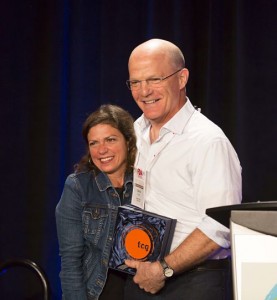WASHINGTON, D.C.: When John Maeda began his talk at the TCG conference this morning with the claim, “Money is a medium for expression,” audience members may have wondered if they’d walked into the wrong conference hall. After all, theatre artists do, like many other kinds of creatives, tend to treat their “ramen days” (to borrow a phrase Anna Deavere Smith used in last night’s plenary) as a rite of passage. Maeda’s forward-thinking point, which appropriately followed Smith’s call for Actors’ Equity to “do better” by its actors, came at the midway point in this morning’s plenary.
The second day of Theatre Communications Group‘s annual conference kicked off its morning plenary with an introduction from TCG director of conferences and field-wide learning Devon Berkshire. In her opening address, Berkshire noted the fact that this was her first conference in her new position, and asked for a round of applause for former director of conferences Dafina McMillan. McMillan, who was in attendance, received a standing ovation. “[Dafina] had a big impact on me personally,” said Berkshire, turning to address McMillan directly. “It feels a little surreal to stand onstage and see you out there in the house like a regular ol’ attendee…The conference is different because of you.”
Berkshire then introduced Charles Newell, artistic director of the Court Theatre and a native of D.C., who presented the Alan Schneider Director Award. Newell himself is a past recipient of the award to Kimberly Senior. In his address, Newell noted that Schneider was known for developing career opportunities for young artists and directors, and was both a leading director for the works of Samuel Beckett and Edward Albee as well as a president of TCG. “He was a lifelong advocate for new work,” said Newell, among it many works “we now consider classics of the American theatre canon.” Newell referred to himself as one of the “sweet 16” who have been honored with the Schneider award in the past. He spoke to his own personal experience working with Schneider, saying that he had been “privileged to bask in the fiery cauldron of Alan’s process while serving as his assistant director on Pieces of Eight at the Acting Company.”

Newell then introduced Senior, this year’s honoree. “I believe she beautifully exemplifies the defining qualities of this award,” said Newell. Newell went on to quote Pulitzer Prize-winning playwright Ayad Akhtar, who once said that Senior “often speaks of the genus of ‘being invisible’ as her great aspiration, to serve the play. I admire this greatly and feel she lives up to her aspiration.” This quote, Newell pointed out, could be pulled directly from No Author Better Served, the correspondence of Samuel Beckett and Alan Schneider.
In her acceptance speech, Senior began by thanking TCG directly for supporting a directing award. “The fact that this award even exists is so meaningful to all of us,” she said. “TCG has been such a big part of my path.” She recalled “searching for jobs in paper copies of ARTSEARCH,” and “looking forward to [her] American Theatre magazine” each month, before thanking the awards panel. “How are we, American theatremakers, going to address the deeply fractured world that we live in? Not only in our work, but in the conversations surrounding our work.” She cited her work on Akhtar’s incendiary play Disgraced, and called on conference attendees to embrace their similarities, and to “dive into the abyss that surrounds us and plant our seeds there.” She underscored the urgency of perpetuating important discussions through theatre. “The time is now, this is our moment. We must do our job.”
When the plenary’s main speaker, director and technologist John Maeda, took the stage, he got straight to his point. “I’m here to talk about becoming a leader as a creative person,” he said. Maeda, who had a successful career as an artist before becoming the president of the Rhode Island School of Design (RISD), acknowledged the challenges that creative people face in balancing creative freedom and the need to be financially supported. “Money is usually taught as being evil,” he said. “I’m a venture capitalist. If you’re on the spectrum of thinking that, I am in hell.” The quip was the first of many ice-breaking moments which received loud laughter from the audience.
Joking aside, though, Maeda advocated a changed attitude surrounding money in the arts. “I find that a lot of people in the arts have enormous business expertise,” he said. “I want to fight for creative people.” The origin of this attitude comes from Maeda’s own success, in particular his time as a college president. “We love to fight against power. We love to fight against ‘the Man.’ But suddenly I was the man.”
Maeda began to suggest ways in which traditional leadership could be approached in creative ways, distinguishing between a “traditional” leader and a “creative” one. “A traditional leader likes to sustain order, but a creative leader wants to take risks,” he said.
The nub of Maeda’s talk centered on his time at RISD. He told a story about how, early in his time there, Maeda decided to call the top 100 students who’d been accepted to attend the school, and “90 percent of them couldn’t come to RISD because they couldn’t afford to.” Suggesting that financial disadvantage both stifled creativity and robbed these students of life-changing artistic opportunities, Maeda said that most of his time at RISD thereafter was spent with scholarships and financial aid as his top priorities.
Maeda’s talk ended with an axiom that might serve us all well in these times of tumult. “A leader tries to bridge the past to the future by standing in the present,” he said.


